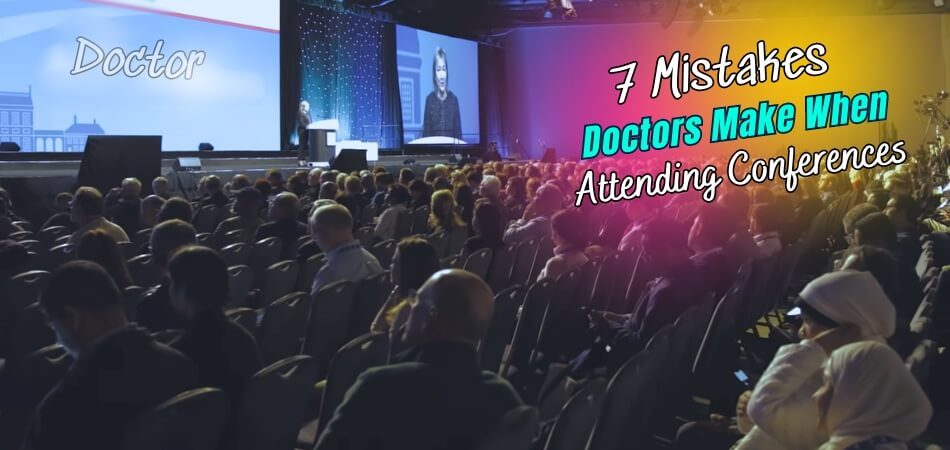Doctors attend medical conferences to strengthen their knowledge and expand their professional networks. These conferences are central to staying current with medical advancements and connecting with industry leaders. However, many doctors often overlook the details that could make their experience more fruitful. They face challenges and make mistakes that reduce the benefits of these medical conferences.
But hopefully, we mention some ways to solve these major challenges in our detailed article on “7 mistakes doctors make when attending conferences.” The most common mistakes among them are not staying updated, skipping planning, failing to follow up, etc. So, to learn more about this topic, stay tuned and read this article for further details.
Why is Medical Conference Preparation Important?
Medical professionals who want to achieve the most from their attendance at a conference should prepare thoroughly. Attendees who prepare properly can manage the schedule efficiently and enjoy the sessions to the fullest. This organized approach maximizes learning and networking opportunities, which are essential for professional growth.
When you participate in an international medical conference with a solid plan, you can better engage with the content and your colleagues. This makes an overwhelming situation manageable and productive. By planning your interactions and knowing which sessions to attend, you can make meaningful connections and gain insight.
Also, when you’re well-prepared for a conference, you’re more likely to absorb and retain the information presented. Instead of worrying about logistics or what to do next, you can focus on the content, particularly when attending international medical conferences that offer valuable insights. With this strategic approach, you’ll leave the conference enriched and inspired.
Top 7 Mistakes Doctors Make When Attending Conferences
Keeping up with current research and connecting with colleagues requires doctors to attend conferences. However, even experienced professionals can make mistakes during a conference. Here, we outline the top seven mistakes doctors make during these events:
1. Not Staying Updated on Schedules
Doctors sometimes forget to check conference schedule updates. Sometimes last-minute changes result in missed sessions. Their lack of attention can cause problems, such as overlaps between sessions or clashes with personal commitments. Regularly reviewing the schedule will help them stay on track and ensure they don’t miss important events.
2. Overwhelming Themselves with Information
Conferencing offers a lot of information, which can be confusing. Doctors often try to absorb as much as they can without taking effective notes. As a result, much of the information doesn’t stick, which reduces the value of the event.
In the end, they leave the conference with a messy collection of notes that they can’t organize until later. Creating a structured note-taking system can improve retention and make review easier.
3. Skipping Planning
Conferences can be confusing if there is no clear agenda. Attending sessions and workshops without planning leads to wasted time. This lack of preparation prevents them from fully benefiting from the event, preventing them from taking advantage of crucial learning opportunities. Setting specific goals for each day will help them maximize their time and focus on key topics.
4. Missing Networking Opportunities
Networking is one of the most important aspects of conferences, but many doctors neglect this aspect. They get various networking opportunities but fail to engage meaningfully. Missing out on these interactions limits professional growth and collaboration potential, which are crucial for career advancement and learning innovative practices.
5. Ignoring Self-Care
Conference schedules can add stress to the individual, causing them to neglect their well-being. During these busy events, many doctors forget to hydrate, rest, or eat properly. Ignoring these basic needs can impair their focus and energy, making it more challenging to absorb valuable information and engage actively.
Prioritizing self-care will ensure they remain alert and fully present during sessions.
6. Not Engaging in Q&A Sessions
Participating in Q&A sessions provides direct interaction with speakers, but many doctors are hesitant to do so. Their unwillingness to ask questions minimizes deeper learning opportunities. The more they engage with complex topics, the better their understanding will be. Preparing questions in advance can help build confidence to participate actively.
7. Failing to Follow Up
After the conference, maintaining contact with new colleagues and reviewing session notes is crucial. However, doctors often overlook this step. The omission results in missed opportunities to develop new knowledge or strengthen professional relationships. Following up promptly with contacts made can lead to fruitful collaborations and continued learning opportunities.
Why Do Doctors Attend Medical Conferences?
Medical conferences provide doctors with an excellent opportunity to enhance their knowledge, skills, and professional networks. At these medical conferences for doctors, healthcare professionals from around the world convene to exchange ideas, experiences, and insights. Here are the key reasons why doctors prioritize attendance at these events.
- Continuing Education: Doctors go to these conferences to keep up with medical standards and fulfill continuing medical education requirements.
- Latest Research: They learn about the latest research and advancements in medicine, which can directly impact their clinical practices.
- Peer Interaction: Interacting with fellow medical professionals from different regions allows doctors to exchange ideas and discuss clinical experiences, which increases their knowledge.
- Networking Opportunities: These gatherings provide doctors with multiple networking opportunities, allowing them to connect with potential mentors, partners, or employers.
- Expert Access: Conferences usually feature experts from diverse fields, allowing attendees to interact with experts directly.
- Innovative Technologies: Exhibitions showcase new tools and technologies that can improve diagnostics and patient care.
- Professional Recognition: Presenting research at these conferences helps doctors gain recognition in their field and advance their careers.
- Motivational Boost: Doctors can be greatly motivated and inspired by being around like-minded colleagues who share a passion for medicine.
How to Overcome These Mistakes?
There are many benefits to attending medical conferences, but maximizing these benefits requires planning and active participation. To have a successful conference, you need to recognize and overcome common mistakes. Listed below are effective steps doctors can take to manage these common mistakes smoothly:
Step 1: Regularly Update Your Conference Itinerary
Maintaining an up-to-date knowledge of the conference schedule is essential. Utilize the conference app or website to stay up-to-date on last-minute changes. Staying updated allows you to adapt your plans smoothly and guarantees you don’t miss crucial sessions.
Step 2: Develop a Systematic Note-Taking Strategy
Maintain a reliable method for capturing and organizing notes to avoid information overload. Whether you prefer digital tools or traditional notebooks, choose a system that allows you to easily retrieve and review information post-conference.
Creating a consistent format for your notes will help you identify key themes and insights more easily. Review and summarize your notes after each day to reinforce what you’ve learned.
Step 3: Identify Key Events Beforehand
Prepare your schedule before the conference. Highlight must-attend workshops, keynotes, and potential educational tracks. This allows you to allocate your time effectively while covering your interests without feeling rushed. Additionally, leave some flexibility in your schedule for spontaneous sessions that may arise or for networking opportunities that present themselves.
Step 4: Maximize Networking Efforts
Plan networking events rather than just attending them. Identify potential contacts in advance and prepare topics for discussion. Focus on building meaningful exchanges that may lead to collaborative opportunities when networking. Following up with your new contacts after the conference can help solidify those relationships and develop future collaboration.
Step 5: Incorporate Wellness Breaks
Make self-care a priority during the conference by scheduling regular breaks. These pauses are essential for recharging and can significantly boost your focus and engagement, particularly when it comes to managing jet lag for international medical conferences effectively. A regular step back from multi-day events can also prevent burnout.
Step 6: Ensure Effective Follow-Up
Organize your contacts and session notes after the conference. Take the time to connect with key individuals you met and integrate new knowledge into your practice. This follow-up is critical for cementing relationships and applying new insights effectively.
What Not to Do at a Medical Conference as a Doctor?
Doctors benefit greatly from medical conferences, which provide unparalleled access to new research and networking opportunities. However, certain missteps can reduce their effectiveness. Being able to identify what you shouldn’t do is as important as understanding what you should do. The following is a detailed explanation:
- Don’t Skip the Opening and Closing Remarks: Ignoring the opening and closing speeches is a missed opportunity. These segments often set the tone and summarize key takeaways.
- Don’t Stay Silent During Discussions: Staying silent during panel discussions or Q&A sessions limits learning. Engage actively; your questions could lead to valuable insights.
- Don’t Eat Alone: Meals are perfect opportunities for informal networking. Eating alone wastes a chance to connect with colleagues in a relaxed setting.
- Avoid Multi-tasking During Sessions: Focusing on your phone or laptop instead of the presentation can cause you to miss important information. Be attentive to what speakers are saying.
- Don’t Dismiss Sessions Outside Your Specialty: Sticking exclusively to your field might seem efficient, but exploring multiple topics can provide new perspectives and innovation opportunities.
- Avoid Isolating Yourself: Isolating yourself from other attendees can make your conference experience less meaningful. Participate in social events and networking opportunities.
Key Steps to Prepare for a Medical Conference
Attending a medical conference can be rewarding, but proper preparation is essential. By following key steps, you can maximize your learning and networking opportunities. Here’s how to get ready for your conference.
Research the Conference
Start by thoroughly researching the conference details. Check the agenda, speakers, and session topics. Understanding what will be covered helps you align your goals. This ensures you prioritize the sessions most relevant to your interests.
Set Clear Objectives
Before the conference, establish specific goals for your attendance. Decide what you hope to achieve, such as learning new techniques or networking with professionals. Writing down these objectives will keep you focused. Clear goals will guide your choices throughout the event.
Arrange Travel and Accommodation
Book your travel and accommodation well in advance. Look for flights that fit your schedule and budget. Staying close to the conference venue can save time and transportation costs. Research hotels or other lodging options early to secure the best rates.
Prepare Your Materials
Gather all necessary materials before the conference. This includes business cards, a notebook or digital device for taking notes, and any presentation materials if you are speaking. Being organized will help reduce stress and ensure you are ready to participate fully.
Plan Your Schedule
Review the conference schedule and plan which sessions you want to attend. Highlight key workshops and networking events that align with your goals. Staying organized will help you manage your time effectively during the conference.
Frequently Asked Questions
This section addresses common questions regarding the mistakes doctors make when attending conferences. Understanding these issues can help medical professionals maximize their conference experience and avoid potential pitfalls.
How Can Doctors Engage with Conference Content if They Can’t Attend Every Session?
Doctors can explore recorded sessions or virtual platforms post-conference, participate in online forums or webinars, and connect with presenters or attendees through social media. These alternatives provide access to valuable content and networking opportunities beyond physical attendance.
What Should Doctors Prioritize when Planning for a Medical Conference?
Doctors should prioritize sessions that align with their professional interests and goals. This strategic approach allows them to focus on acquiring knowledge relevant to their practice or research, making the conference more productive and personally beneficial.
How Can Doctors Leverage Social Media and Digital Platforms During Conferences?
Social media platforms allow doctors to amplify their conference experience by sharing insights, connecting with virtual attendees, and participating in online discussions. Engaging on digital platforms extends networking reach and promotes continuous learning beyond physical conference boundaries.
Is There an Effective Way for Doctors to Overcome Language Barriers During International Conferences?
To overcome language barriers, doctors can utilize translation services, attend sessions with language-specific tracks or subtitles, and engage in visual aids or demonstrations. Preparing dual-language presentation materials and seeking clarification during discussions ensures effective communication and knowledge exchange.
How Can Doctors Maintain a Work-Life Balance While Attending Multi-Day Conferences?
The best way to maintain work-life balance during multi-day conferences is to plan around work commitments, set clear boundaries for private time, and stay connected to family and colleagues. During the event, doctors should prioritize sleep and nutrition, manage information intake, network purposefully, and take time for reflection.
Final Thoughts
The purpose of medical conferences is to provide continuous professional development, yet sometimes their benefits are limited by challenges. Through exploring the “7 mistakes doctors make when attending conferences,” we’ve highlighted critical areas where doctors commonly fall short. The causes range from poor planning and overload with information to ignoring networking opportunities and neglecting self-care.
Identifying these mistakes is the first step toward enhancing their conference experiences. Addressing these errors improves learning and networking outcomes and enhances overall engagement at these important events. In doing so, doctors will maximize each conference’s potential for growth and collaboration.








